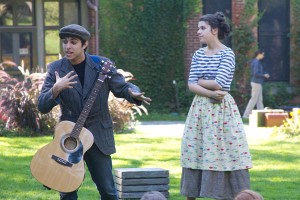While Cornell University’s adaptation of “The Cherry Orchard” brings the more than 100-year-old classic outdoors and presents its complex script in English rather than in Russian, it manages to convey the pain of loss and the strength of family with a timeless grace.

Written by Russian playwright Anton Chekhov, the play revolves around one family’s struggle to maintain composure while losing their beloved family home and cherry orchard. The main character Lyubov Ranyevskaya, played by Cornell senior Alessandra Kirsch, owns the estate and is forced to sell it when she spends too much money on extravagant clothing. Throughout the process of selling the orchard, Ranyevskaya and her family face the death of one of their own. Through the family’s struggle, the play shows how love can keep a home together.
While adapting to the outdoor stage — with all its elements and interruptions — the actors in “The Cherry Orchard” give powerful performances that match the dark power behind Anton Chekhov’s words.
Kirsch’s striking performance reveals how loss can affect an individual. Ranyevskaya is an eccentric character and Kirsch embodies her personality perfectly. Kirsch’s emotions range from ecstatic joy to utmost anguish within the duration of the play and she uses vocal tones and exquisite facial expressions to help convey the character’s successes and struggles. Kirsch’s acting makes her character universally relatable and contributes to the depth and power of Chekhov’s work.
Cornell doctoral student Robert Surton’s portrayal of Leonid Gayev, Ranyevskaya’s brother, is less believable, and Surton overplays his character and seems loud and one-dimensional throughout the show. Though the script contains dialogue that reflects a wide range of emotions, Surton’s acting lacks the depth and creativity that makes Kirsch’s acting successful. Despite a few scenes when Surton turns his performance around to appropriately emphasize Gayev’s somewhat endearing character traits, his poor delivery unintentionally turns some of the play’s serious scenes into comedy for the audience.
Two visiting professional actors — Jeffrey Guyton and Carolyn Goelzer — joined the company of student actors. The difference in ages creates the necessary distinction between the younger characters and the older personalities in the play. As an 87-year-old butler, Guyton mumbles and curses, and acts as a much needed comedic relief in Chekhov’s mostly serious play.
The production’s outdoor setting is a more realistic portrayal of the orchard’s natural beauty. Director Beth Milles welcomes the elements and sounds from the garden by Cornell’s Big Red Barn, and the actors improvised when the planned script was interrupted by the weather. Although it seemed difficult for the actors to work around the sounds from Cornell’s homecoming marching band that played throughout the performance, the play progressed smoothly through the final moments of the last act.
Despite the complexity of the depressingly realistic themes in the script, the actors’ portrayal of the characters in “The Cherry Orchard” expressed the right balance of emotions — positive and negative — to offset the harshness of the play, allowing the potentially disheartening experience to still be enjoyable.
“The Cherry Orchard,” though poignant, provides a sense of catharsis for the audience, and proves this Russian classic’s exploration of how a family deals with love and loss is all but dated in modern society.
“The Cherry Orchard” will play at 5:30 p.m. tomorrow on the Cornell Arts Quad.




